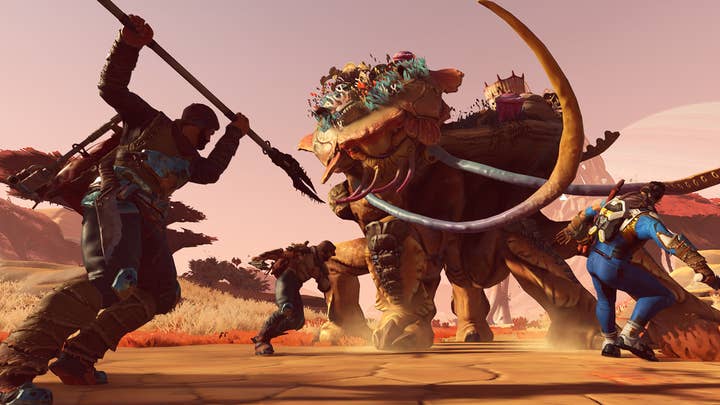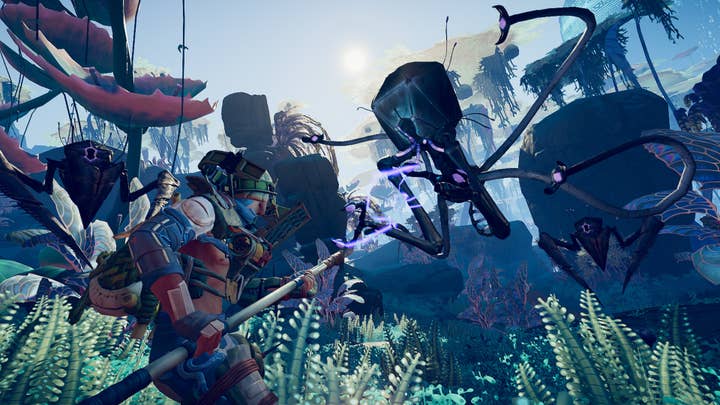Population Zero and the dangers of Early Access hype
Three key lessons from a game made by a studio of 60 people, that had a very rough launch
This industry has seen many games rise and fall due to different circumstances.
Today, we'd like to bring you one such story, which is currently unfolding. We are yet to see if our game dies or makes it through a very rough launch, and that's why we want this article to be a digital diary of what's happening to us. We'll talk about the mistakes we made, missed opportunities, and how we're trying to get back on the right track. Our goal in writing this article is to help others like us not make the same mistakes.
We are Enplex Games, and at the beginning of May we launched an Early Access title, Population Zero. The game's development -- as often happens with new independent studios -- was riddled with difficulties both financial and technological. We managed to pull through, and on May 5 the game came out.
Our goal in writing this article is to help others like us not make the same mistakes
For those of you who are unaware of the game's existence, we should explain what the project is all about: Population Zero is a survival MMO game, full of exploration elements. It boasts PvP and PvE modes, a great visual style and interesting mechanics -- 7-day survival cycles, account progression that unlocks building, Iron Man mode, etc.
There are a few other key pieces of information that we have to talk about, so that you have the full picture before we actually get to the rough launch part.
- The game switched from a free-to-play model to premium.
- Two years before release we launched a proper founder's pack system. The price of the largest supporter pack was $80. The founder's pack didn't help fund the development; it only covered some very basic needs of the studio.
- We opened our Steam page on February 28, 2020, two months and one week before launch. We know that doing such a thing is suicidal. Most games put up a store page a full year prior to release. That happened because we pivoted to a premium model very late in development when we realized we didn't have enough content to support it, and we'd need another year to launch in free-to-play.
- On paper, and visually, the game looked great. We marketed it as such. We had a decent budget to do just that.
- The game changed direction a few times during development. It's safe to say that we got the core gameplay right, but many quality of life features were still missing -- hence Early Access.
- Early hands on impressions were great, with MMORPG.com calling us an "unpolished gem." That perhaps made us too cocky.
- With aggressive marketing, a good trailer, and well-made gameplay featurettes, as well as Steam noticing us and giving us a boost a week prior to release, we launched with more than 117,000 wishlists gathered in nine weeks.

On May 5, we pushed the "Release into Early Access" button, and from that moment all hell broke loose.
The first thing we saw is Population Zero in Steam's new releases section. Then in the popular and trending categories. Then we get to the number one bestseller in our region, which is CIS. After that we jumped to the number one Top Seller Global, with friends sending us screenshots of our game in the main Steam feature in the US and many European countries.
A dream come true, right? We worked hard to get to this point. We worked our asses off, all for the sake of this release. The dream didn't last long.
We worked our asses off, all for the sake of this release. The dream didn't last long
The first reviews of the game that came in an hour or two after we launched were devastating. We were thinking we'd be in the Mixed category, though some of us dreamt of Mostly Positive, but Overwhelmingly Negative reviews were pouring in -- by the time we were at 100 reviews, our rating was at 11%. In about an hour, Steam's algorithm kicked us out of featured games, and in five to ten hours we were out of the picture entirely.
We were devastated, and we lost time while we were trying to figure out what was going on. Today we have the full picture -- or at least we think that we do.
Mistake #1: Multiple DLC packages on Steam
We put up two cosmetics packages for sale on Steam -- they included the soundtrack, the artbook, small stuff. They also included the skins our early supporters bought two years ago, and they thought we betrayed them by selling the packs they bought for $80 on Steam for a mere $10.
A series of miscommunications led to this. First, we named the Steam packages the same as they were named when we were selling them to our founders. Second, we didn't elaborate on the fact that many features from the founders pack were missing from the Steam packages, including alpha/beta access to the game -- two years of testing and sharing and building the game -- the founder's name in the credits, two beta keys to share with friends, and some other features.

Those were the features we actually thought were worth something, but the community did not agree, and so we got the first batch of negative reviews. We published a letter from the team apologizing for this, promising we'd remove the packages as soon as we could -- a Steam employee has to confirm such a removal, so we couldn't do it on our own end fast enough. We also promised compensation to those affected by our rash decision of monetizing the cosmetic items.
It was a bit too late though. The damage was done. Most of the negative reviews about the packages came from the CIS region, and in total they were 3% to 6% of all negative reviews. They were the first ones, though, and it seemed to snowball from there.
We had 3% to 6% negative reviews from founders angry with the game as it launched -- again, this is our fault, we let them down and we know that. As soon as negativity poured in, we began receiving more and more “Not Recommended” ratings for what felt like any reason. The tutorial was bad, the connection was bad, anything and everything. Some of it was very true, some of it felt biased and only came because of the overall score, while the largest part of our loyal community had yet to tell us how they felt.
By the time we actually asked them for a review -- not a positive review, mind you, just a review -- it was too late. The Steam algorithm was already working against us.

Mistake #2: We were too effective at marketing before Early Access
Our marketing campaign was aggressive. Our game was in Early Access. These things don't go well together.
The main metric of success before launch was our wishlist count, and we focused on gathering those. We only had two months, and we had enough information to know that wishlists affect a lot of things. To surpass 100,000 wishlists we had to pour out as much info about the game as we humanly could. We were perfectionists in the content we provided, shooting in-game footage and then cutting around the best pieces. We talked about what the game had to offer, and we never gave false promises -- we know that gamers call bullshit on those.
Our marketing campaign was aggressive. Our game was in Early Access. These things don't go well together
We never stopped to think that the game in Early Access would have many bugs, with some features and quality-of-life yet to be implemented. We never stopped to think that maybe we should launch slowly and quietly -- and to be honest with you, we couldn't afford a quiet launch, since the studio burn-rate was very hard to handle. People had a much better impression of how the game ran and its features when they were looking at gameplay videos, and what they got was not on par with their expectations.
The picture we were presenting was carefully made. There were no downgrades to graphics or anything, but we still gave an A+ impression, and so people ignored the fact that we were in Early Access. We only have ourselves to blame. Chasing wishlists without fully preparing our audience for the experience was a mistake, and doing all that in such a short period of time made the situation worse.
Mistake #3: Basic features for an MMO were missing
The game did not support a Friend system, which gamers are used to nowadays. Yes, you could play with friends, but you had to use Steam Friends to join them, and there were many restrictions -- the game is session-based, and so you had to quit your session to join your friend, for example.
The game page states that Population Zero is an MMO/co-op experience, and it is, but getting it to work was difficult. At times it felt like almost half of the reviews were about that particular feature. During the COVID-19 outbreak people wanted to socialize, and we didn't implement the feature correctly and didn't explain well how it works. That was a huge mistake overall and it cost us dearly. We've removed the co-op tag on our store page until we're sure that we support players in the right way.
The future
There were a ton more gameplay mistakes, but the above are the earliest ones. We found them when we sat down to analyze the situation a few days after launch.
Population Zero currently has a small but very active fanbase. Concurrent users are low, but it doesn't really matter right now as we made the game to be a single-player experience if you wish it to be. We have been open and communicative with our fans, having recently published a public roadmap via Trello that we'll be using to keep track of new and upcoming improvements to the game.
At this point we got our ratings back on track -- as of this writing we're at 46%, and we mostly get positive reviews now. Even though the sales are slow and new reviews are scarce, the rating is only trending upwards.
Dmitry Muratov has been working in PR and marketing for the last eight years. He launched Rawg.io and is currently working as publishing producer and video content producer at Enplex Games and at Hypetrain Digital, a publishing company, producing even more awesome games.
